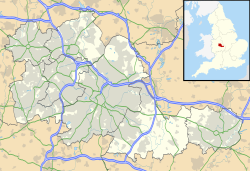| Site of Special Scientific Interest | |
| Location | West Midlands |
|---|---|
| Grid reference | SK034045 |
| Coordinates | 52°38′18″N1°57′04″W / 52.63824°N 1.95119°W |
| Interest | Biological |
| Area | 23.8 hectares |
| Notification | 1986 |
| Location map | English Nature |
Clayhanger Marsh is a 23.8 hectares (59 acres) biological site of Special Scientific Interest in the West Midlands. The site was notified in 1986 under the Wildlife and Countryside Act 1981. It is located to the north of Walsall.
Contents
The first vagrant bufflehead recorded in the West Midlands county was found here in June 2004. [1]
